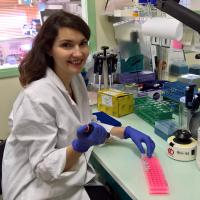
Bioeconomy Reading time 3 min
Biocontrol expert creates INRAE public-private partnerships
Published on 20 March 2017
The perfect combination of laboratory expertise and professional skills
“Truly understanding life means focusing on the microscopic”—Cécilia Multeau was compelled to pursue graduate work in biology for this very reason. The desire to carry out applied research with socioeconomically relevant results led her to earn a professional master’s degree at the University of Montpellier II, and she stayed on to complete a PhD in INRA’s Joint Research Unit for Diversity, Genomes, and Microbe/Insect Interactions. While in graduate school, she also worked at Biotop, an InVivo subsidiary. After completing her PhD, she became a permanent employee. She continued her work on densoviruses, insect pathogens that are used to biologically control crop-killing caterpillars. In total, she spent seven years exploring this topic.
Although Multeau still puts in hours at the lab, she has an increasing appreciation for the overlap between the public and private realms of research. Establishing productive partnerships is a tricky business. Private business often view academic research as moving too slowly. Following some changes to INRA’s partnership-related policies, the institute has created discipline-based “innovation clusters,” which are headed by expert scientists with professional experience; the goal is to establish public-private partnerships and promote innovation transfer. Such a position is a perfect fit for Multeau. In October 2016, she became head of the biocontrol-focused innovation cluster, located at the INRA center in Montpellier. With the aim of establishing a comprehensive strategy for putting INRA’s research to work in the real world, she collaborates with the leader of the Plant Health and Environment Division and coordinates a multidisciplinary team made up of legal experts, implementation officers, intellectual property engineers, and financial service officers.
Biocontrol research: resources ripe for use
To design an effective partnership strategy, Multeau must know exactly what biocontrol research is being conducted at INRA and match available offerings with the socioeconomic needs of private stakeholders. The technical and practical skills that she has developed over the course of her career come in handy every day. Since she has first-hand experience with biocontrol research, she can realistically estimate the time, materials, and labor that will be involved in generating biocontrol products. She can also gauge how far along a given product or technology is in its development trajectory. To be successful in her new position, she must draw on the same skills that she used as a researcher: raw energy, intellectual curiosity, and scientific rigor. Furthermore, innovation transfer requires being interested in and understanding expectations on both sides of the fence.
From the very beginning, Multeau glowingly described INRA’s resources: “I am particularly impressed by INRA’s diverse research projects. The institute generates many discoveries and innovations that are easily transferred, as well as well-conceived projects, which makes the task of finding private partners much easier.” INRA plays close attention to public opinion and socioeconomic expectations. As a result, the institute is actively seeking alternatives to pesticides; these alternatives may take the form of more integrated practices or different products, including those that use biological control. As an example, Multeau cites entomovectoring, a topic of focus for certain new projects by researchers in the Plant Health and Environment Division. In entomovectoring, a pest insect is targeted using a beneficial insect that both acts as a natural enemy and serves as a vector for delivering disease-fighting agents to crops. An entomovectoring project is currently underway in the Plant Pathology Unit at the INRA center in Avignon.
MINI-CV
As of October 2016: Head of Biocontrol Innovation Cluster, INRAE Center of Occitanie-Montpellier
2012–2016: R&D Biology/Biotechnology Project Coordinator at Biotop, an InVivo subsidiary
2009–2012: PhD student. Thesis research on the potential utility of densoviruses in biocontrol efforts. Université des Sciences et Techniques du Languedoc (University of Montpellier II). CIFRE programme—INRA/University of Montpellier/Biotop.
2007–2009: Master’s student. Biotraceability, Biodetection, and Biodiversity Programme. Université des Sciences et Techniques du Languedoc (University of Montpellier II).
2004–2007: Professional master’s student. Biotraceability, Biodetection, and Biodiversity Programme. Professional graduate programme. Université des Sciences et Techniques du Languedoc (University of Montpellier II).
